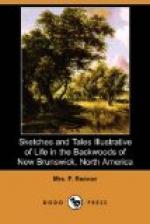approach, which otherwise would not be heard over
the smooth road. The glassy way was crowded with
skaters, gliding past with graceful ease and folded
arms, “as though they trod on tented ground.”
We soon reached our destination, and found assembled
a large and joyous party. The festival commenced
in the morning, and continued late. The fare
was luxuriant, and the bride, in her white dress and
orange blossoms (for, be it known, such things are
sometimes seen, even in this region of spruce and pine),
looked as all brides do, bashful and beautiful.
The “grave and pompous father,” and busy-minded
mother, had a look which, though concealed, told that
at heart they rejoiced to see their “bairn respeckit
like the lave,” and “all indeed went merry
as a marriage bell.” We and some others
left at midnight. The air was piercingly cold,
and the bear skins in which we were wrapped soon had
a white fringe, where fell the fast congealing breath.
There was no moon, and the stars looked dim, in the
fitful gleam of the streamers of the aurora borealis,
which were glancing in corruscations of awful grandeur
along the heavens, now throwing a blood red glare
on the snow, their pale sepulchral rays of green or
blue imparting a ghastly horror to the scene, or arranging
themselves like the golden pillars of some mighty
organ, while, ever and again, a wild unearthly sound
is heard, as if swords were clashing. Those mysterious
northern lights, whose appearance in superstitious
times was supposed to threaten, or be the forerunner,
of dire calamity; and no wonder was it, for even now,
with all the light science has thrown upon such things,
there is attached to them, seen as they are in this
country, a feeling of dread which cannot all be dispelled.
Travelling on the ice is not altogether free from
danger; and even when it is thought safe, there are
places where it is dangerous to go. The best
plan of avoiding these is to follow the track of those
who have gone before—never, but with caution,
and especially at night, striking out a new one.
One of the parties who accompanied us wished to reach
the shore. There was a path which, though rather
longer, would have led him safely to it, but he determined
to strike across the unmarked ice, to where be wished
to land. All advised him to take the longer way,
but he was resolute, and turned his horse’s
head from us. The gallant steed bounded forward—the
golden light was beaming from the sky—and
we paused to watch his progress. A fearful crashing
was heard—then a sharp crack, and sleigh,
horse, and rider vanished from our sight. ’Twas
horrible to see them thus enclosed in that cold tomb.
Assistance was speedily sought from the shore, but
ere it came I heard the horrid shout of “steeds
that snort in agony,” while the blue sulphurous
flash from above showed the man struggling helplessly
among the breaking ice. Poles were placed from
the solid parts to where he was, and he was rescued.
He was carried to the nearest house, and with some
difficulty restored to warmth. The sleighing rarely
passes without many such accidents occurring, merely
through want of caution.




